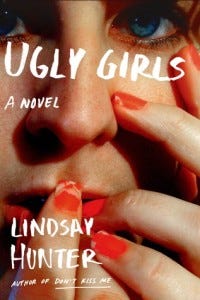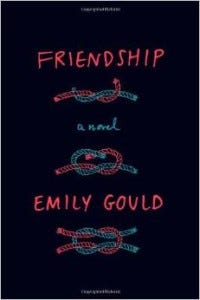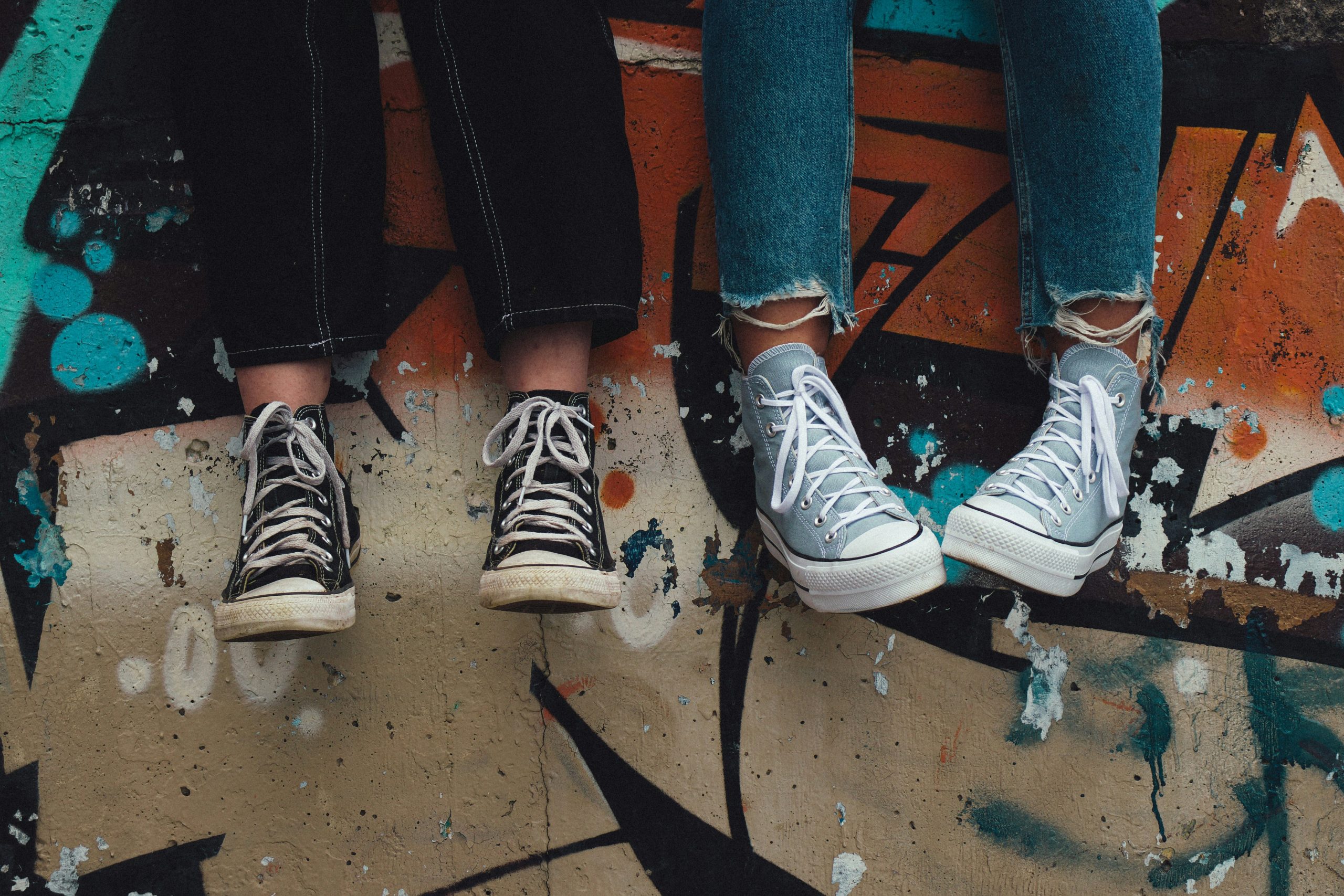essays
Is Every Unhappy Friendship Unhappy in Its Own Way?
I

Adults are expected to grow out of the phrase “best friends forever.” Whenever I hear it, I’m brought back to the night Hurricane Irene struck Brooklyn — back to the empty streets, rocking traffic lights, and rain that hit me from all sides as I headed to my best friend Vanessa’s house to confront her. Things had gone missing from my family’s home: a bottle of wine, a handle of rum, two of my grandmother’s rings, and it had already been a long year of making excuses for her. That was the moment I grew out of “best friends forever.”

Of the many stunning debut novels from last year, few plumbed platonic relationships like Emily Gould’s Friendship and Lindsay Hunter’s Ugly Girls. Their two worlds couldn’t be less alike — Ugly Girls’ is a rural wasteland of trailer parks while Friendship is a New York of quarter-life crisis — yet despite their differences, both books focus on girls and women who depend on each other. They share secrets, insecurities and even the silent envy of things they admire in each other. But at the center of this tenderness and dysfunction is something real and frightening: the prospect that even “forever” relationships can come to an end.
While reading these two novels, it’s hard not to think of big screen classics like Butch Cassidy and the Sundance Kid or Thelma and Louise. I think of Vanessa’s favorite movie, The Deer Hunter, about childhood friends who go in different directions in life after being prisoners of war in Vietnam. I think of Robert De Niro’s character, Mike, pleading, “Come on, Nicky. Come home. Just come home. Home.” I’ve watched that famous scene — the one which ends with Nicky (Christopher Walken) shooting himself — over and over again. I’ve wondered if there was any way Mike could fix it, if he could ever get Nicky to put down the gun.

Friendship, like so many of its predecessors, reads a like platonic love story. Readers are taken from the moment Bev and Amy meet to the moment they split apart in flashes between the past and the present. At one point Bev even asks Amy, “Do you have to say something, confirming you’re best friends?” It’s laughably close to the romantic relationship talk that so many dread, but it’s coming from two 20-somethings who have no one else; Amy has burned everyone at her previous job, from celebrities to peers, while Bev is lost in an aimless search for temp work, still trying to find her place in New York. Both desperately need someone to rely on.
Although men do occasionally enter the picture, Bev and Amy always find love, fulfillment and support in one another. The two even observe the couples around them and come to the conclusion: “All these people are obviously going to break up once their sexual chemistry peters out. But we’ll be together forever.” The sentiment is identical to so many late night conversations I had with my best friend Vanessa after things with my first serious boyfriend fell apart — that regardless of all the things that may come and go, we would always be able to rely on each other. Just like Bev and Amy, and so many other best friends, we relied on each other as “allies in a world full of idiots and enemies.”
In Ugly Girls, the forces fighting against Baby Girl and Perry are clear: suburban poverty, Internet stalkers, broken families. At home, Perry’s mother struggles with alcoholism, while Baby Girl is constantly confronted by the accident that left her older brother and idol, Charles, brain damaged. Being best friends is hardly a saving grace either: The two girls have grown apart but keep drifting back together. They’re like Bev and Amy in that way, relying on each other’s company out of habit, as a reliable escape.
“Restless” is a word that comes to mind while reading Ugly Girls. Baby Girl and Perry spend their days ditching school and their nights hot-wiring cars to joyride to Walmart. It’s nothing that Vanessa and I would have pulled in Brooklyn, but it brings me back to getting a homeless guy to buy us pineapple rum in high school and to all of our aimless walks that somehow always ended at the Promenade, where we would admire the Manhattan skyline, while keeping our eyes peeled for cute boys and spitting gum at the cars speeding below on the Brooklyn-Queens Expressway. In Ugly Girls, Baby Girl and Perry spend this lost time dreaming of a future when things won’t be so aimless. In Baby Girl’s mind:
One day she wouldn’t live with Charles no more, she wouldn’t be friends with Perry, she’d be someone else with hair and a job and a memory of the days she sat in the parking lot of school with an unloaded gun.
For Baby Girl, who does everything she can to be “hard” (her real name is Danya), even growing up is just an opportunity to become someone else, a process that requires ditching her best friend to leave behind her adolescence.
I never saw growing up that way. A year before Hurricane Irene, Vanessa and I both got summer jobs bartending together. Our boss would drive us to bars around the city to get a sense of how other places ran their business. Speeding over the BQE, we sat in the backseat of his convertible with the entire city beside us. This is what adulthood would be like: possibilities, freedom, us together.
When friends cease being friends, the obvious question is: What happened? The question can most easily — if not accurately — be answered by a single event: In Ugly Girls, Baby Girl and Perry push things too far when they assault someone; in Friendship, Bev decides to take on a huge life responsibility and Amy shies away. Both moments ring out like the gunshot at the end of The Deer Hunter; they are the tragic bows that tie up the narrative, the tourniquets that stanch the bleeding. But it’s never quite that simple. Each time I try to think of a way to convince Nicky to put down the gun, I get to the same place: His mind’s already made up. You can make him remember, but you can’t bring him back.
After Hurricane Irene, when acquaintances asked why I stopped talking to Vanessa, I told them that she blew our trust by stealing family heirlooms. It was easier to say than explaining the million little ways she had become selfish, negative, difficult to be around, that I had become tired of meeting at the same bars to do the same things. After our summer bartending together, she started making scenes when she got too drunk, started getting kicked out of places. She would tell lies that were too big in an affected Brooklyn accent she hadn’t grown up with. It was as if the real her had been replaced bit-by-bit. In Ugly Girls, Lindsay Hunter describes this dissonance perfectly as Baby Girl drives Perry to meet an Internet admirer:
Perry had the feeling that she’d never met [Baby Girl] before, this bald person she was letting drive her somewhere, she looked familiar but Perry had no idea who she was. She was in the car with a stranger.
Perry tries to convince Baby Girl to turn the car around. She threatens to jump from it, but after Baby Girl begs, Perry stays. There are only so many ways to try to convince someone to come home.
Friendship, unlike Ugly Girls, ends with — SPOILER ALERT — reconciliation. Amy apologizes to Bev for everything in a lengthy email, confessing, “I worry that even if you can forgive me for abandoning you when you most needed a best friend, I won’t be able to fit into your new life.” Readers aren’t privy to what happens when the two meet each other again, but Bev does forgive Amy. Ugly Girls doesn’t tie the bow so neatly. In all the chaos, it’s unclear whether anyone is forgiven.
Next to Bev’s forgiveness, my years-long silence towards Vanessa seems ugly, cowardly, stubborn. I roll with the excuse that she’s a different person now, that we might as well be strangers. In ways we are: I used see doppelgangers of her around the neighborhood or on the train and wonder if she had changed beyond recognition. Other times, I’d see it really was Vanessa and swiftly look away.
The truth in Ugly Girls and Friendship is that sometimes friends grow into people who are incompatible. Nobody is at fault. Fiction can only teach us so many ways to forgive: to be civil, to show concern, to mourn, to remember better times. The most recent time I saw Vanessa on the street, she averted her eyes and hid her face away in a cloud of mentholated smoke. I looked at her the entire time, thinking of Amy and Bev, Perry and Danya, those fictions that reflected some version of our friendship back at me. In our decision to stay silent, all I could think was: we aren’t really strangers, are we?









